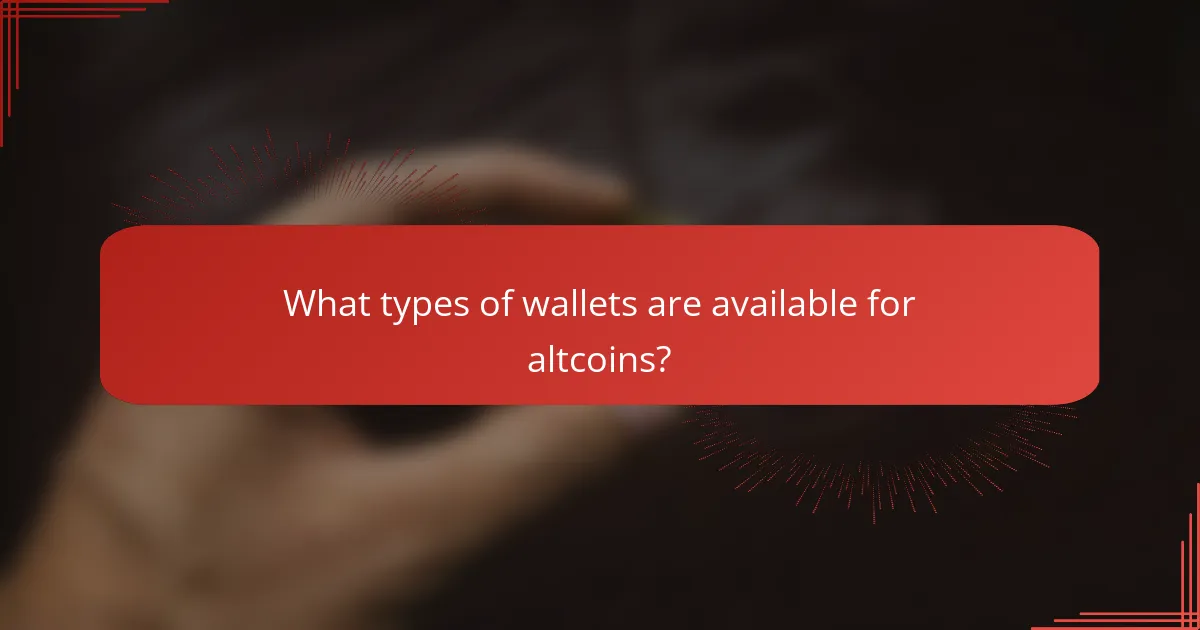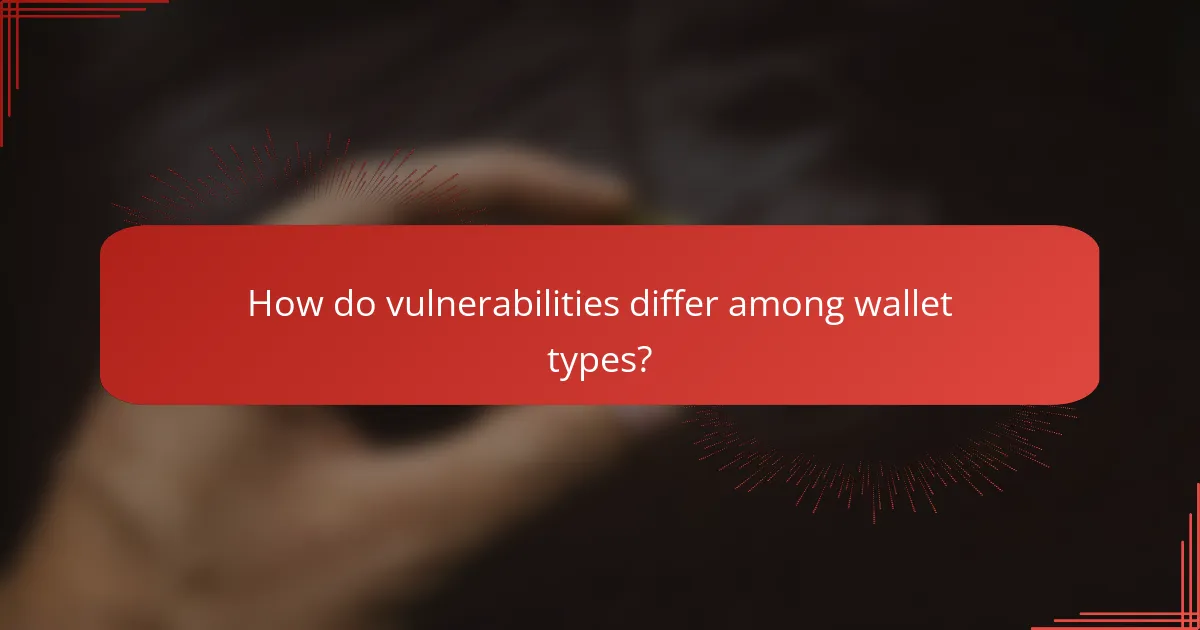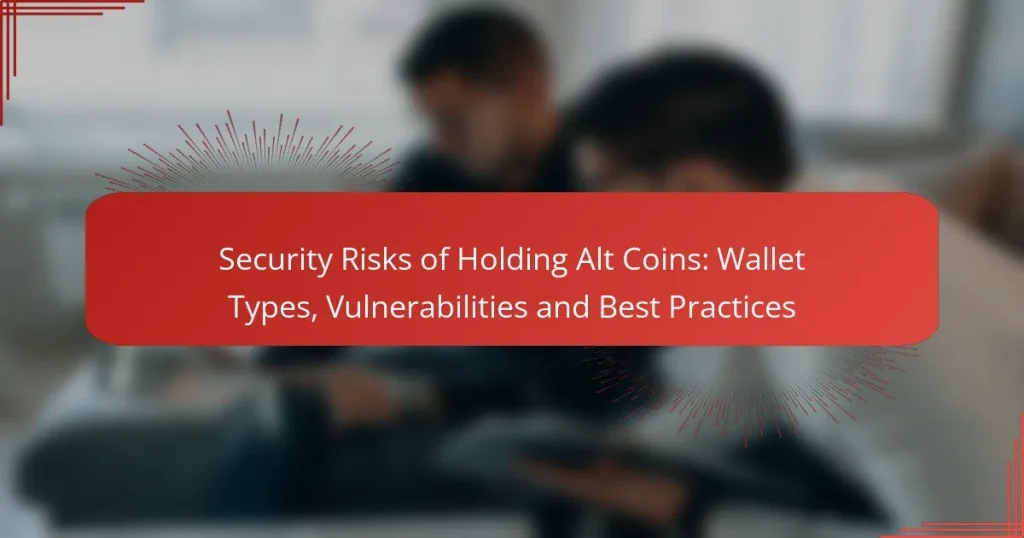Holding altcoins presents various security risks that can threaten your investments, making it essential to understand these vulnerabilities. Different wallet types, including hot, cold, hardware, and software wallets, offer varying levels of security and accessibility, catering to diverse user needs. By recognizing the strengths and weaknesses of each wallet type, you can better protect your altcoin assets from potential threats.

What are the security risks of holding altcoins?
Holding altcoins comes with various security risks that can jeopardize your investments. Understanding these risks is crucial for protecting your assets and making informed decisions.
Market volatility
Market volatility is a significant risk associated with altcoins, as their prices can fluctuate dramatically within short periods. This unpredictability can lead to substantial financial losses if investments are not managed carefully.
Investors should be prepared for price swings that can range from single-digit percentages to over fifty percent in a single day. Setting stop-loss orders and diversifying your portfolio can help mitigate these risks.
Regulatory uncertainties
Regulatory uncertainties pose a risk to altcoin holders due to the evolving legal landscape surrounding cryptocurrencies. Different countries have varying regulations, which can impact the legality and usability of certain altcoins.
Staying informed about local regulations and potential changes is essential. Engaging with reputable exchanges and platforms that comply with regulations can reduce the risk of sudden legal issues affecting your investments.
Fraud and scams
Fraud and scams are prevalent in the altcoin market, with many investors falling victim to Ponzi schemes, fake ICOs, and phishing attacks. These fraudulent activities can result in the total loss of your investment.
To protect yourself, conduct thorough research on any altcoin before investing, and only use trusted exchanges. Be cautious of offers that seem too good to be true, and always verify the authenticity of projects.
Technological vulnerabilities
Technological vulnerabilities can expose altcoin holders to risks such as hacking and software bugs. Many altcoins are built on complex blockchain technologies, which may have undiscovered flaws that could be exploited.
Regularly updating wallets and software, as well as using hardware wallets for storage, can help safeguard against these vulnerabilities. Consider using altcoins with established security protocols and a strong development community.
Loss of private keys
Loss of private keys is a critical risk for altcoin holders, as these keys are necessary to access and manage your assets. If you lose your private key, you may permanently lose access to your altcoins.
To prevent this, securely back up your private keys and consider using a hardware wallet for added security. Avoid storing keys on devices connected to the internet, as this increases the risk of theft.

What types of wallets are available for altcoins?
There are several types of wallets available for holding altcoins, each with distinct features and security levels. The main categories include hot wallets, cold wallets, hardware wallets, and software wallets, which cater to different user needs and preferences.
Hot wallets
Hot wallets are connected to the internet and provide quick access to your altcoins, making them convenient for frequent trading. However, their online nature exposes them to higher security risks, such as hacking and phishing attacks.
Common examples of hot wallets include web wallets, mobile wallets, and desktop wallets. While they are user-friendly, it’s advisable to limit the amount of cryptocurrency stored in these wallets to minimize potential losses.
Cold wallets
Cold wallets are offline storage solutions that offer enhanced security for altcoins by keeping them away from the internet. This significantly reduces the risk of hacking, making cold wallets ideal for long-term storage of cryptocurrencies.
Examples of cold wallets include paper wallets and hardware wallets. Users should ensure they store their cold wallets in a secure location, as losing access to them can result in permanent loss of funds.
Hardware wallets
Hardware wallets are a type of cold wallet that uses physical devices to store private keys securely. They are considered one of the safest options for holding altcoins, as they require a physical device to access funds.
Popular hardware wallets include Ledger and Trezor. Users should always purchase hardware wallets directly from the manufacturer to avoid counterfeit products that may compromise security.
Software wallets
Software wallets are applications that can be installed on computers or mobile devices, providing a balance between convenience and security. They can be either hot or cold wallets, depending on whether they are connected to the internet.
When choosing a software wallet, consider factors like user reviews, security features, and ease of use. Regularly updating the software and using strong passwords can help protect your altcoins from potential threats.

How do vulnerabilities differ among wallet types?
Vulnerabilities in cryptocurrency wallets vary significantly based on their type, affecting security and accessibility. Understanding these differences is crucial for safeguarding altcoins against potential threats.
Hot wallet vulnerabilities
Hot wallets, which are connected to the internet, face higher risks due to their constant online presence. Common vulnerabilities include hacking attempts, phishing attacks, and malware infections that can compromise private keys.
Users should be cautious when using hot wallets for large amounts of cryptocurrency. It’s advisable to limit the funds stored in these wallets and regularly update security measures, such as two-factor authentication.
Cold wallet vulnerabilities
Cold wallets, or offline storage solutions, offer enhanced security but are not entirely immune to risks. Physical theft, loss, or damage can lead to the permanent loss of funds if proper backup procedures are not followed.
To mitigate these risks, users should store cold wallets in secure locations and create multiple backups in different physical locations. This ensures that access to funds remains possible even if one wallet is compromised.
Hardware wallet vulnerabilities
Hardware wallets provide a secure method for storing cryptocurrencies offline, yet they can still be vulnerable to specific threats. Supply chain attacks, where malicious software is pre-installed on a device, can compromise security before the user even receives it.
To protect against these vulnerabilities, purchase hardware wallets directly from reputable manufacturers and verify the device’s integrity upon receipt. Regular firmware updates are also essential for maintaining security against emerging threats.
Software wallet vulnerabilities
Software wallets, which run on devices like computers or smartphones, can be susceptible to various vulnerabilities, including malware and software bugs. These wallets require regular updates to patch security flaws and enhance protection.
Users should choose well-reviewed software wallets that offer strong encryption and security features. Additionally, employing antivirus software and avoiding suspicious downloads can help protect against malware that targets software wallets.

What are the best practices for securing altcoins?
Securing altcoins involves implementing several key practices to protect your digital assets from theft and loss. By following these guidelines, you can significantly reduce the risk of vulnerabilities associated with various wallet types.
Use two-factor authentication
Two-factor authentication (2FA) adds an extra layer of security to your altcoin wallets. By requiring a second form of verification, such as a text message code or an authentication app, you make it much harder for unauthorized users to access your funds.
When setting up 2FA, choose a reliable method. Apps like Google Authenticator or Authy are generally more secure than SMS-based codes, which can be intercepted. Always ensure that your recovery codes are stored safely in case you lose access to your 2FA device.
Regularly update wallet software
Keeping your wallet software up to date is crucial for maintaining security. Developers frequently release updates to patch vulnerabilities and improve functionality, so regular updates help protect against potential exploits.
Set reminders to check for updates at least once a month. If you use a hardware wallet, ensure its firmware is current. Avoid using outdated software, as it may expose you to security risks that could lead to loss of your altcoins.

